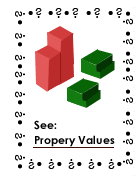The Beachwood Board Games Affairs Desk
Much to the chagrin of the good people of Atlantic City, N.J., Hasbro is remaking its classic Monopoly board to better appeal to upscale customers insufficiently impressed by Marvin Gardens and Baltic Avenue. Late this summer, Hasbro will announce the makeup of the new board, as determined by voters choosing from among three landmarks in 22 cities somehow deemed more amenable to fantasy property acquisition than the home of the Atlantic Palace Suites and Trump Taj Mahal.
![]()
The contenders for a board space representing Chicago: Wrigley Field, Navy Pier, and North Michigan Avenue.
This doesn’t sound like a very fun game at all.
We’ve got a better idea. Remake the entire board in Chicago’s image. In fact, we’ve already done the work. We call it Chicago-opoly: The City That Cheats. Let the good times roll.
![]()
OBJECT . . . The object of the game is to become the wealthiest player through buying, renting, and selling properties and politicians.

EQUIPMENT . . . The equipment consists of a board, 2 dice, 10 tokens, 32 condos and 12 office buildings. There are Clout and Campaign Chest cards, Title Deed cards for each property, politicians, money, and tacitly acknowledged favors.
PREPARATION . . . Place the board on the table and put the Clout and Campaign Chest cards face down on their allotted spaces. Each player chooses one token to represent him/her while traveling around the board. Developers get two tokens.
TOKENS . . .
1. Bulldozer
2. Denver Boot
3. Wrecking Ball
4. Blue Light Surveillance Camera
5. Sack of Money
6. Taser
7. Hummer
8. Concrete Planter
9. Rat
10. Voting Machine
(Some editions may contain an El car which runs two spaces behind its anticipated position and a blue bag which only goes around the board once and winds up at the dump with the rest of the trash.)
MONEY . . . Each player is given $1.5 million divided as follows: two each of $500,000s, $100,000s, and $50,000s; six $20,000s; five each of $10,000s, $5,000s, and $1,000s. Players can also contribute personal funds to themselves and others in any amount they wish as long as they disclose the contributions to the Funny Money Board of Elections. All money in this edition is colored green, and is, in fact, legal tender within Illinois, and nationally after laundering it through the Democratic National Committee.
BANKER . . . Bill Daley is the banker. In the event that more than one game breaks out at the same time, he will appoint a proxy banker who will come to your house and supervise your game for 10 percent of the winner’s revenue.
TAXES AND FEES . . . The City of Chicago shall collect a 8.6 percent sales tax on all property transfers and a 1.2 percent garbage tax to collect extra trash generated by your Chicago-opoly parties. In additon, Chicago-opoly owners must pay $250 annually for a gaming license and pass another $100 cash annually under-the-table to inspectors related to high-ranking union officials.
THE PLAY . . . Starting with the highest bidder, or the player most closely related to Richard M. Daley, each player rolls the dice and advances from the starting square labeled City Hall. Two or more tokens may rest on the same space at the same time, though the richer player has the option of forcing the the poorer player to move back one neighborhood. This is called “gentrification.” Minorities can be kicked completely off the board and forced to play Candyland at the kiddie table.
CITY HALL . . . Each time a player passes City Hall, he/she either collects $2,000 or pays $2,000, depending on whether he/she has scored a city contract or is still contributing to the mayor’s campaign fund in order to land one.
BUYING PROPERTY . . . Whenever you land on an unowned property, you may buy that property from the bank at its printed price, or possibly less depending on who you know. You receive the Title Deed card showing ownership; place it face up in front of you, unless you choose to hide your ownership amidst a series of complex land trust deals buried deep in the bowels of Cook County Circuit Court.
If you do not wish to buy the property – Block 37, for example – the Banker sells it at auction to the highest bidder. Unless the Banker would rather sell the property without competitive bidding. Either way.
PAYING RENT . . . When you land on property owned by another player, the owner collects rent from you in accordance with the list printed on its Title Deed card. Property owners can also raise rent for no apparent reason other than to screw you.
It is an advantage to hold all the Title Deed cards in a color-group because the owner may then charge double rent. If “gentrification” has been declared, propety owners can charge triple rent.
CLOUT AND CAMPAIGN CHEST CARDS . . . When you land on either of these spaces, take the card at the bottom of the deck and follow the instructions. Return the card to the top of the deck.


Posted on August 20, 2006


